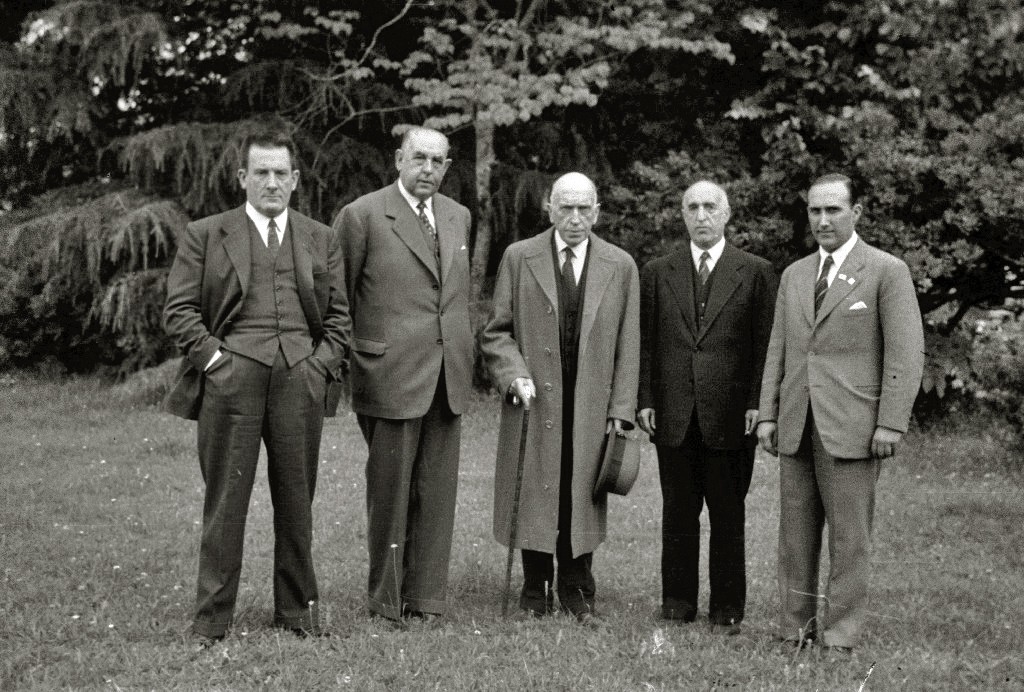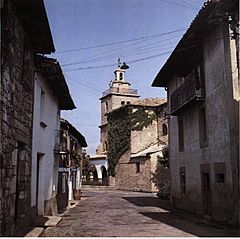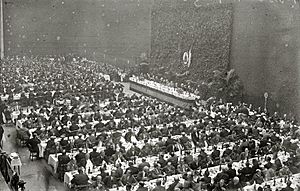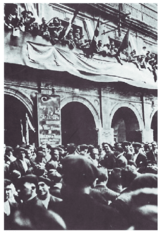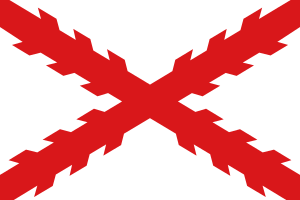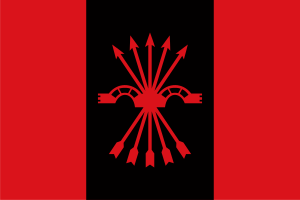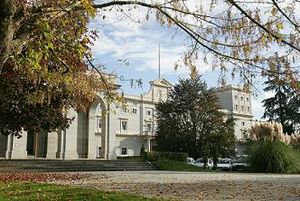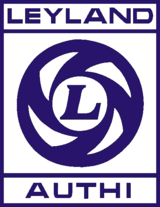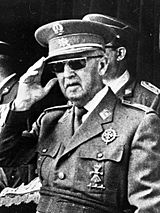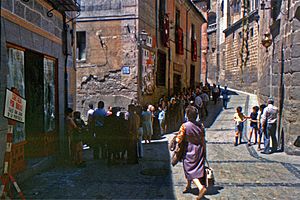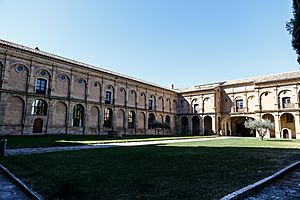Amadeo Marco Ilincheta facts for kids
Quick facts for kids
Amadeo Marco Ilincheta
|
|
|---|---|
|
|
|
| Born |
Amadeo Marco Ilincheta
1900 Navascués, Spain
|
| Died | 1987 Navascués, Spain
|
| Nationality | Spanish |
| Occupation | entrepreneur |
| Known for | politician |
| Political party | Carlism, FET, AFN |
Amadeo Marco Ilincheta (1900-1987) was a Spanish politician. He was part of the Carlist movement until 1942. After that, he joined the government of Franco.
He is best known as an important figure in Navarre during the Franco era. He was a long-time member of the regional government, called the Diputación Foral. He served as a representative for the Aoiz-Sangüesa area from 1931. Then he served continuously from 1940 to 1979. He was even the acting president of the Diputación at times.
From 1943 to 1954 and again from 1967 to 1977, he was a member of the Francoist Cortes. This was like a parliament. From 1942 to 1954, he was also on the Consejo Nacional of the Falange Española Tradicionalista. He also served as the mayor of Navascués many times starting in 1927.
Contents
Amadeo Marco's Early Life
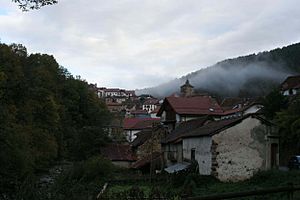
Amadeo Marco's family, the Marcos, lived in the Valle de Roncal for centuries. This is a mountain community in Navarre. His ancestors became important local leaders. For example, Pedro Marco was an "Almirante" (a local leader) in the late 1500s.
Amadeo's great-great-grandfather was Cristobál Marco Martín. His grandfather, Julián Ramón Marco Ezquer (born 1819), was a successful cattle breeder. He was known as the head of a local family.
In 1895, Amadeo's father, Pedro Nolasco Marco Pérez (1867-1913), married Bruna Ilincheta Zalba (1869-1931). She was from Navascués, a nearby town. The couple settled in Navascués. It is not clear what Amadeo's father did for a living. Some say he was a cattle breeder, others say he ran a flour mill.
Amadeo had at least six siblings, mostly boys. None of them became famous. Some held small local jobs. For example, José Marco Ilincheta led the Falange in Navascués during the early Franco era.
Amadeo went to school in Zaragoza from 1906 to 1916. He attended a boarding school run by the Piarists. After finishing high school, he studied law at the University of Zaragoza. Some sources say he later moved to Madrid and graduated from Universidad Central. Another source says he graduated in Zaragoza in 1931.
He also studied medicine and nautical sciences but did not finish those studies. In the mid-1920s, Marco returned home. He worked on improving his family's flour mill business in Navascués. He lived in the family house most of the time. Some documents listed his job as "lawyer," but there is no proof he ever worked as one. He was also called a "property owner." Some sources say he worked in the merchant navy.
Amadeo Marco never married and had no children. He was the godfather of Telmo Aldaz, a Carlist leader.
Amadeo's First Steps in Politics (1927-1936)
Amadeo Marco's family had mixed political views. Some relatives were linked to liberalism. For example, his grandmother's brother, Angel Pérez Marco, was a liberal representative in the Navarrese government. However, his mother's father supported Traditionalist ideas. It is known that at least four of Amadeo's brothers later joined the Carlist militia.
Amadeo's political journey began in the mid-1920s. He was active in the primoderiverista state party, Unión Patriótica. In 1927, he became the mayor of Navascués. He was quite young for such a high position. Some people think his family's influence helped him. Marco stopped being mayor in 1929.
When the monarchy fell and the Republic began in 1931, a new Diputación Foral was formed. This was Navarre's self-government. Marco was known as a right-winger. He was seen as a "monarchist" or a "Jaimista" (a type of Carlist). Even so, the new governor appointed him to the Diputación. He represented the Aoiz-Sangüesa area. He was also made mayor of Navascués again.
Marco complained that these positions should be filled by elections, not appointments. But he accepted them "for the good of the country." His rise was again linked to his family's influence.
During his second term as mayor and first term in the Diputación, Marco was involved in talks about Basque-Navarrese autonomy. He was unsure about the first plan because it was not religious enough. But he supported a changed version of the plan. He helped gather support from local town halls through the Carlist newspaper El Pensamiento Navarro.
In late 1931, Marco became worried about the Diputación's left-wing policies. He was especially angry when they refused to fund a new seminary in Pamplona. As a protest, he resigned from the Navarrese government in December 1931. His resignation was accepted in 1933. As mayor, he also ignored an order to remove crucifixes from schools. In 1932, he strongly opposed efforts to enforce this order. At this time, he was already a member of Juventud Jaimista, a youth group.
Civil War and Political Changes (1936-1942)
Before the Spanish Civil War, Marco was a local politician. He worked at the county and provincial levels. In 1935, he helped create the Bloque de Derechas. This was a right-wing group in Navarre.
He took part in the plot against the Republic in early 1936. He was part of the Aoiz section of the war committee in Navarre. He also led the requetés (Carlist militia) for Navascués and Salazar Valley. After getting the order to rise, he helped form Carlist militia troops.
He then joined the command of Tercio Nuestra Señora de Camino. This battalion fought on the Northern Front, then in Teruel, and finally in Levante. He was recognized for his bravery and received many military awards. In 1939, he finished the war as a captain. Some sources say that thanks to Marco, no one was killed in Navascués during the anti-Republican crackdown.
In 1940, Marco was appointed to the first Francoist Diputación Foral. This was on the advice of Rodezno. The Carlist leaders in Navarre were divided. The national Carlist leader, Fal Conde, asked Marco to help find a solution. Marco traveled to Andalusia to talk with Fal, who was under house arrest in Seville.
Marco was considered to lead the Navarrese Carlist group. He also took command of the Navarrese requetés. However, he lost his chance to lead when he followed an official order to lower the Spanish flag after the death of Alfonso XIII in 1941. Also, after the Nazi-Soviet war started, he offered requeté support to the German consulate in Pamplona. The Navarrese Carlist leader, Joaquín Baleztena, immediately rejected this. Marco openly said that the Carlist leaders were "already dead in the party."
Marco fully supported the unification of Carlism into Franco's state party. In 1941, when Serrano Suñer gave him military awards, Marco wore his full FET uniform. This made many mainstream Carlists angry.
In 1942, Marco suggested that Traditionalists should work with the government. He wanted them to take seats in the Pamplona city council. The new Navarrese Carlist leader, Jesús Elizalde, saw this as disloyal. Later in 1942, Marco was appointed provincial secretary of FET. He then joined the III Falangist Consejo Nacional. He did not ask for approval from the Carlist leaders.
Because of his strong support for the Falange, his pro-German views, and his disregard for the Carlist party, he faced consequences. In 1942, he was removed from his requeté command in Navarre. Then he was expelled from Comunión Tradicionalista (the Carlist party).
Amadeo's Role in Early Francoism (1942-1954)
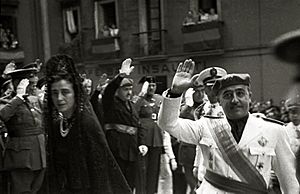
In the early 1940s, Marco was a very powerful figure in Navarre for Franco's government. He was involved in most of the government's plans in the province. He worked closely with the civil governor. His power came from being a member of the Diputación Foral, the Falangist Consejo Nacional, and a leader of FET in Navarre.
His influence grew even more in 1943. Because he was in the Consejo, he automatically became a member of the Cortes Españolas, Franco's parliament. Also in 1943, Marco supported Karl Pius Habsburg. Karl Pius claimed to be the Traditionalist king, Carlos VIII. He toured the country with the government's permission. Marco traveled to Andorra to speak with Karl Pius. Then, with Arrese, he helped promote Karl Pius. Carlos VIII made Marco the Navarrese representative in his organization's Consejo Nacional.
Marco strongly opposed the main Carlist group led by Fal Conde. For example, he told requeté fighters not to attend an anti-government rally in Pamplona in 1945. He also spoke against reopening their club, which was closed after the rally turned into riots.
In the mid-1940s, Marco was appointed head of the Navascués zone militia. This militia was used in operations against anti-Franco fighters. At first, he had a great relationship with the civil governor, Juan Junquera, appointed in 1945. They traveled Navarre together. Marco shared his knowledge about the people and places.
However, Marco soon felt that Junquera wanted to centralize power. He thought Junquera was against Navarre's traditional separate rules. So, they became enemies. In 1948, Marco went to Madrid to complain about Junquera. He argued that Navarre, though loyal to Franco, might become doubtful if its special rights (fueros) were taken away. In late 1948, he resigned as deputy head of the Movimiento in Navarre. This was a protest against the governor's policy.
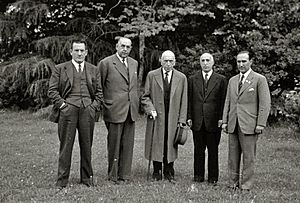
In 1949, Marco was re-elected to the Diputación for his second term. He ran on a strong anti-Junquera platform. Despite his disagreements, he was also re-appointed to the FET Consejo Nacional in 1949.
Around 1950, Marco changed his approach. He sought alliances with other Carlist groups against the new civil governor, Luis Valero. In 1950, he asked for the reopening of javierista clubs. He tried to create a common Traditionalist list for the local elections in 1948 and 1951. However, Fal Conde saw him as a traitor.
In 1952, Marco was re-appointed to another term in the Consejo Nacional. But Valero fought back. He accused Marco of being a disloyal local boss. In 1954, Valero fired him from his position as mayor of Navascués, which he had held since 1949. Soon after, he lost his seat in the Diputación. Also, a special order removed Marco from the Consejo Nacional, which meant he lost his seat in the Cortes.
The conflict became public, with insults exchanged. Marco demanded that Valero stop calling him "dear friend." He said having friends like Valero would be very unlucky. He also said that by attacking him, Valero was attacking Navarre.
Marco's Middle Years in Francoism (1954-1967)
Valero's victory in the power struggle in Navarre did not last long. He was soon dismissed and moved to a job in central government. Marco lost his leadership positions in FET and his seats in the Consejo Nacional and the Cortes. However, he regained his seat in the Diputación Foral in 1955. He was easily elected from the Aoiz-Sangüesa district. He even beat the candidate supported by the Movimiento. In 1961, he was re-elected with no opponents.
During this time, he moved away from carloctavismo. The person claiming to be Carlos VIII died, and the movement fell apart. Marco became a symbol of Francoism in Navarre. His enemies called him the "eternal Navarrese boss." He was always loyal to Franco. In the mid-1960s, Marco started to work more closely with the Movimiento again. When the Diputación president, Felix Huarte, criticized efforts to check candidates' political views in upcoming local elections, Marco disagreed.
Many people say that Marco opposed the modernization of Navarre during his time in government. He especially fought against any plans for industrialization. He believed these changes threatened Navarre's local identity. He feared losing the influence of Catholic traditionalism and strong loyalty to Franco. He also worried about a traditional Basque culture.
He wanted to prevent people from leaving rural areas and moving to cities. He thought this would cause big cultural changes. In 1963, he opposed the Opus Dei project to open a university in Pamplona. In 1964, he spoke against the "Industrial Promotion Plan." In 1965, he opposed the "Agricultural Promotion Plan." He also worked to get rid of the Dirección General Técnica. This was a new group in charge of building new roads and other projects.
However, he was also president of the Board of Trustees for the Universidad de Navarra faculties. For years, he worked to build a highway across Navarre. He also pushed for a railway line that would connect Navarre with France. He believed this would prevent the region from facing economic problems.
During the middle Franco era, Marco held some business positions. Most of these were on the boards of companies partly owned or controlled by the Diputación Foral. The most important was Caja de Ahorros de Navarra, a regional bank. Since Caja was the main owner of OPPOSA (a potato organization), Marco became its president.
He was also president of the Pamplona Regional Council of El Hercules Hispano, an insurance company. He was a co-owner of Gas Navarra. He also helped start AUTHI, a car manufacturing company. Some writers say Marco used his position in the Diputación to help these private companies with public money. He gave them tax breaks, communal property, and direct financial aid. Some see him as a typical example of a corrupt "Francoist figure." However, other scholars say Marco was completely honest during his public service. They claim he did not get rich unfairly and lived a simple life, almost poor later on.
Marco's Later Years in Francoism (1967-1975)
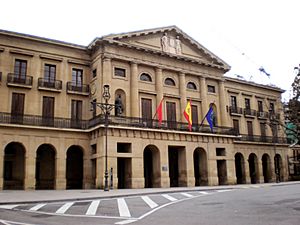
After 12 years, Marco returned to the Cortes Españolas in 1967. This time, he got his seat as a representative of provincial governments, not as a national councilor. He was part of the Defense Committee. In the 1967 elections for the Diputación Foral, Marco ran in the Aoiz-Sangüesa district again. Unlike in 1961, he had an opponent who supported modernization. He won again. However, he was still in the minority in the government. The Diputación was controlled by the "desarrollista" (development-focused) group. This group was led by the Diputación vice-president, Felix Huarte.
The power balance changed in 1971 when Huarte died. Marco was the oldest member of the chamber. So, he was appointed acting vice-president until the end of the term. Some scholars believe that at this point, the "traditionalist sector" regained control. They started to reverse some of the earlier changes. Also in 1971, Marco's Cortes term was extended. He continued to represent local self-government institutions. Five out of six Navarrese voters supported him. Some progressive groups tried to sue him, claiming he improperly helped some candidates. But nothing came of it.
In the early 1970s, Marco was the acting president of the Diputación. He handled daily tasks, like building new infrastructure in the province. He supported Basque culture. He helped set up a board to promote the Basque language and became its president. This followed his earlier efforts to create Basque schools (ikastolas).
However, he also had to deal with other Basque issues and new political movements. He strongly condemned the ETA attacks against people and buildings. It was later found that ETA had considered assassinating him. He also spoke against strikes in Pamplona after the MATESA scandal. He carefully criticized the disturbances, saying they threatened jobs and the local economy.
In 1973, Franco met with the Marco-led Diputación. Franco expressed his thanks for their support. In 1974, Marco was elected to the Diputación for the sixth time in a row. He became its vice-president. In the Cortes, Marco joined the Permanent Committee. This committee worked when the Cortes was not in session. His rise was mostly symbolic and automatic because of his age. At that time, he was one of the oldest members. Shortly before Franco's death, Marco was seen as an iconic Francoist leader in Navarre. Some considered him the perfect example of the regime's local boss.
Transition to Democracy (1975-1979)
After the Montejurra massacre in 1976, the local government condemned the violence. They said it should never happen again. A few months later, Marco successfully opposed a plan to make the regional government more democratic. Afterward, on behalf of the Diputación, he sent congratulations to Prime Minister Adolfo Suárez.
In early 1977, Marco helped create Alianza Foral Navarra (AFN). This was a right-wing party focused on Navarrese identity. Some scholars called it the post-Francoist "bunker." Marco became its president. The AFN wanted to bring back Navarre's traditional rules. They also supported similar statements from the Diputación. This was against a different plan favored by the UCD party. In the general elections, AFN got 8.5% of the votes in Navarre. It was the fourth strongest political force in the province.
In 1977, AFN and Marco strongly opposed a plan to combine Navarre and the Basque Country into one autonomous region. This plan was being discussed by the Madrid government and Basque politicians. Alianza launched a huge campaign against the project. ETA planned two attempts against Marco. There were many acts of violence against AFN by progressive and nationalist groups. The left-wing press also attacked him. They called him a "notorious fascist" and accused him of using the Diputación for his party's goals.
Eventually, the plan to merge Navarre and the Basque Country was dropped. It was scaled down to a possibility that would need approval in a vote. Historians say Marco's role was very important. He was a key person who prevented the Basque-Navarrese merger.
In 1978, the Diputación agreed with the Madrid government that the civil governor would no longer be the president of the body. Marco agreed to become the acting president. In this role, he led talks with the central government about Navarre's exact form of government. He took a firm stance, wanting to restore the 19th-century Ley Paccionada (a special law for Navarre).
He was not supported by the more flexible UCD party. The progressive press made fun of him. In the end, Marco was offered small compromises. These allowed for an "honorable surrender." This led to the Real Decreto Paccionado of January 26, 1979. Also in 1979, he signed agreements on Navarre's election rules and other arrangements.
In 1979, Marco retired from politics. He resigned from all his positions. He moved into Monasterio de Oliva and lived like a monk. In one of his rare interviews, he said he was a Traditionalist and supported Juan Carlos. Shortly before his death, he returned to his home in Navascués. He lived there alone with his dog. His financial situation was difficult. Some accounts say he lived a very simple life, almost in poverty.
See Also
 In Spanish: Amadeo Marco Ilincheta para niños
In Spanish: Amadeo Marco Ilincheta para niños
- Traditionalism (Spain)
- Carlo-francoism
- Carlism
- Carloctavismo


